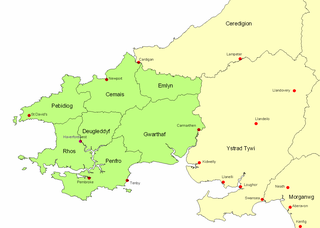Related Research Articles
The Dublin Evening Mail was between 1823 and 1962 one of Dublin's evening newspapers.

The Kingdom of Dyfed, one of several Welsh petty kingdoms that emerged in 5th-century sub-Roman Britain in southwest Wales, was based on the former territory of the Demetae. The medieval Irish narrative, The Expulsion of the Déisi, attributing the kingdoms founding to Eochaid, son of Artchorp, being forced across the Irish sea, in the 5th century; his descendants founding the line of the kings of Dyfed, down to "Tualodor mac Rígin". The Normans invaded Wales, and by 1138 incorporated Dyfed into a new shire called Pembrokeshire after the Norman castle built in the Cantref of Penfro and under the rule of the Marcher Earl of Pembroke.
The Colleen Bawn, or The Brides of Garryowen is a melodramatic play written by Irish playwright Dion Boucicault. It was first performed at Laura Keene's Theatre, New York, on 27 March 1860 with Laura Keene playing Anne Chute and Boucicault playing Myles na Coppaleen. It was most recently performed in Dublin at the Project Arts Centre in July and August 2010 and in Belfast by Bruiser Theatre Company at the Lyric Theatre in April 2018. Several film versions have also been made.
Events from the year 1585 in Ireland.
The Lily of Killarney is an opera in three acts by Julius Benedict. The libretto, by John Oxenford and Dion Boucicault, is based on Boucicault's own play The Colleen Bawn. The opera received its premiere at Covent Garden Theatre, London on Monday 10 February 1862.
Henry Price was an Irish Anglican priest in the late 17th and early 18th centuries.
Nathanael Wilson was a 17th-century English Anglican priest in Ireland.
John Francis was an Irish Anglican priest in the late 17th and early 18th centuries.
Robert Plunket was an Anglican priest in Ireland during the 19th-century.
William Cradock was an Irish Anglican priest in the 18th-century.
Caulfield Byrne Caulfield (14 January 1733 - 23 November 1803 was an Irish Anglican priest in the second half of the 18th century and the first three years of the 19th.
Henry Rugg (1625–1671) was an Anglican priest in Ireland in the second half of the 17th century.
James Forward Bond (1785–1829) was an Irish Anglican priest in the first half of the 19th-century.
Charles Seaver was an Irish Anglican priest in the second half of the 19th century and the first decade of the 20th.
Milo Sumner, D.D. also known as Miles Symner, Miles Symmes or Myles Symner, was an Anglican priest and academic in Ireland in the second half of the seventeenth century.
William McCaghwell, brother of Eugene McCaghwell, Bishop of Clogher, was a priest in Ireland in the early 16th century. He was Dean of Clogher until his death in 1508.
Edmund MacGuire was a priest in Ireland during the 15th century.
Moriertach Magenis was a priest in Ireland during the 15th century.
Maurice McGuire was a priest in Ireland during the 15th century.
Art Mac Cathmhaoil was a priest in Ireland during the late 14th and early 15th centuries.
References
- ↑ TCD alumni
- ↑ "Blood Kindred: W. B. Yeats, the Life, the Death, the Politics" McCormack, W.J. p35: New York; Random House; 2011 ISBN 9781446444245
- ↑ Roots Web
- ↑ Crockford's Clerical Directory 1948 p958: Oxford, OUP, 1938